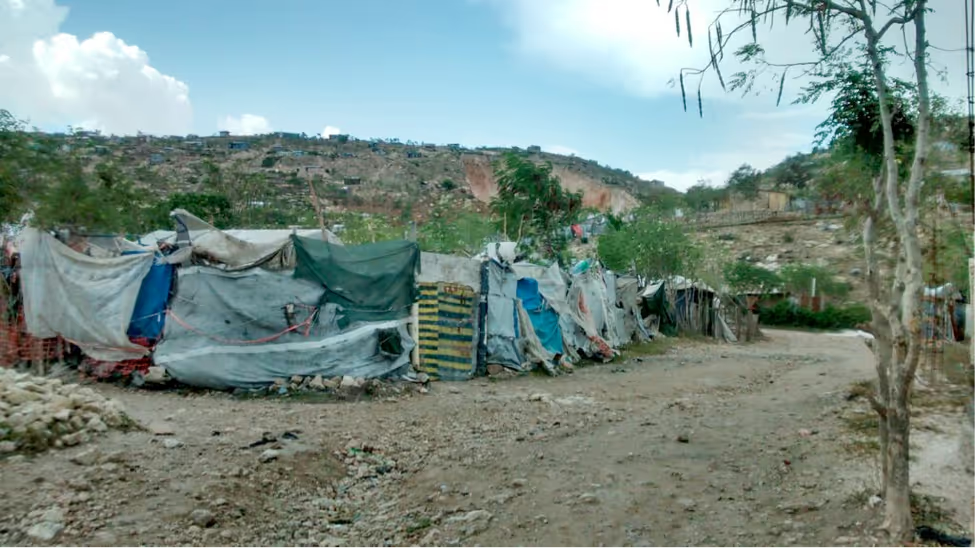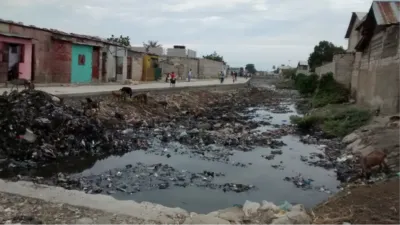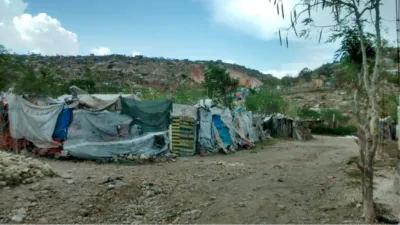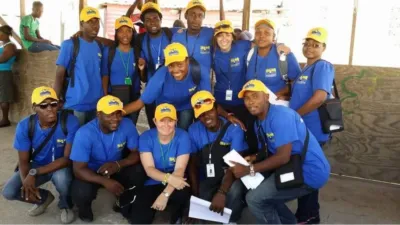Collaborating with a Community-Based Organization to Implement Disaster Mental Health Intervention

By Leah James, Courtney Welton-Mitchell, Merry Roche Stuart, Roger Noel and other SLM Haiti members: http://www.soulajelesprimoun.org/
January 2016
Soulaje Lespri Moun (SLM “Relief for the Spirit” in Haitian Kreyol) is a small local organization formed by Haitian paraprofessionals to provide mental health and psychosocial support to disaster survivors. SLM was born following Haiti’s massive 2010 earthquake, known locally as “Goudou Goudou” (in imitation of the sound made by the ground shaking and buildings falling), which killed more than 200,000 people and displaced 1.5 million. In its aftermath, SLM’s members, earthquake survivors themselves, rallied to provide mental health and psychosocial support to displaced survivors, while also contributing to research on effectiveness of culturally-specific interventions.
For several years following the earthquake, SLM developed, implemented, and evaluated coping skills groups in camps for displaced people in metropolitan Port-au-Prince. For SLM, it has always been important to use culturally-specific group interventions, incorporating Haitian stories, song, dance, and humor, as well as belief systems associated with local religion and culture. At the same time, they have integrated psychoeducation and coping skills associated with Western psychology into their approach, including information about physiological responses to stress and trauma and related relaxation and self-soothing exercises. SLM members often speak about the success with which participants in their counseling groups are able to utilize a wide variety of coping skills – from abdominal breathing and imagery to aspects of Voudou rituals – to manage their distress.
As years have passed since the earthquake, some IDP camps have closed but other have remained, and some have grown into semi-permanent settlements characterized by inadequate housing and infrastructure. Many of these communities face incredible hardship, struggling with insufficient food, shelter, jobs, and education, and exposure to yearly hurricanes and flooding. While working in these communities, SLM noticed that, despite frequent devastation by hurricanes, many community members did not take basic, low-cost steps to protect their families and property. Instead, people were killed, injured, and sickened, and houses and possessions were destroyed by yearly flooding. Data collected by SLM in 2013 (in collaboration with IBS researchers at the University of Colorado) indicated that those with mental health difficulties, including symptoms of depression and PTSD, were the least likely to prepare for disasters. These findings informed the development of a new intervention integrating both mental health and disaster preparedness content, as well as a focus on building social cohesion, using culturally-adapted techniques.By Leah James, Courtney Welton-Mitchell, Merry Roche Stuart, Roger Noel and other SLM Haiti members: http://www.soulajelesprimoun.org/
January 2016
Soulaje Lespri Moun (SLM “Relief for the Spirit” in Haitian Kreyol) is a small local organization formed by Haitian paraprofessionals to provide mental health and psychosocial support to disaster survivors. SLM was born following Haiti’s massive 2010 earthquake, known locally as “Goudou Goudou” (in imitation of the sound made by the ground shaking and buildings falling), which killed more than 200,000 people and displaced 1.5 million. In its aftermath, SLM’s members, earthquake survivors themselves, rallied to provide mental health and psychosocial support to displaced survivors, while also contributing to research on effectiveness of culturally-specific interventions.
For several years following the earthquake, SLM developed, implemented, and evaluated coping skills groups in camps for displaced people in metropolitan Port-au-Prince. For SLM, it has always been important to use culturally-specific group interventions, incorporating Haitian stories, song, dance, and humor, as well as belief systems associated with local religion and culture. At the same time, they have integrated psychoeducation and coping skills associated with Western psychology into their approach, including information about physiological responses to stress and trauma and related relaxation and self-soothing exercises. SLM members often speak about the success with which participants in their counseling groups are able to utilize a wide variety of coping skills – from abdominal breathing and imagery to aspects of Voudou rituals – to manage their distress.
As years have passed since the earthquake, some IDP camps have closed but other have remained, and some have grown into semi-permanent settlements characterized by inadequate housing and infrastructure. Many of these communities face incredible hardship, struggling with insufficient food, shelter, jobs, and education, and exposure to yearly hurricanes and flooding. While working in these communities, SLM noticed that, despite frequent devastation by hurricanes, many community members did not take basic, low-cost steps to protect their families and property. Instead, people were killed, injured, and sickened, and houses and possessions were destroyed by yearly flooding. Data collected by SLM in 2013 (in collaboration with IBS researchers at the University of Colorado) indicated that those with mental health difficulties, including symptoms of depression and PTSD, were the least likely to prepare for disasters. These findings informed the development of a new intervention integrating both mental health and disaster preparedness content, as well as a focus on building social cohesion, using culturally-adapted techniques.

With funding from Elrha R2HC Rapid Response mechanism, SLM, in collaboration with researchers from IBS, University of Colorado and other Haiti-based colleagues, have modified, implemented and evaluated this intervention in three flood-prone communities in metropolitan Port-au-Prince: Cité Soleil, Carrefour and Canaan. In doing so, they have encountered many challenges and successes. SLM has worked in heavy rain and extreme heat, in communities flooded by garbage and animal carcasses, and struggling with gang violence and cholera outbreaks.

Some memorable challenges have also stemmed from many Haitians’ long-standing skepticism about NGOs. The SLM team shares that when they began to work in these communities, “…the residents, having bad experiences with other organizations, wanted to not participate in this project and those who wanted to participate, with some mistrust, have provided false contact information.” However, “seeing that what was promised in the first phase of the project was given to them, the participants began to take confidence, and this confidence escalated especially after training on disaster preparedness and mental health transmitted by SLM.” SLM’s counselors are proud of the trust they have earned from community members: “SLM’s satisfaction comes from seeing distrust turned into confidence on the part of the participants, who have themselves decided to share real information about themselves.”

In addition, it is rewarding for the SLM team members to realize that participants are using techniques from the intervention they provided: “The second reason for our satisfaction is to notice stress reduction rate among participants, and harmony among participants from different parts of the community.” They elaborate: “After the training, many testify that it’s thanks to this training they received which allowed mutual assistance and harmony to reign in their community when floods or storms come. They learned that it is in helping each other that they can better deal with the consequences of a disaster.”
The data from the larger randomized controlled trial has undergone preliminary analysis (N = 480). It is also rewarding to IBS University of Colorado researchers and the whole SLM team, to note that results provide empirical evidence that the disaster mental health intervention with flood-prone communities has been effective. In comparison to the control group, the intervention group showed significant decreases in PTSD, depression and anxiety symptoms, and a significant increase in disaster preparedness behaviors and social cohesion. We look forward to continued collaboration between the University of Colorado and SLM Haiti as the ELRHA funded project team moves into the uptake and dissemination phase of this research
Stay updated
Sign up for our newsletter to receive regular updates on resources, news, and insights like this. Don’t miss out on important information that can help you stay informed and engaged.
Related articles
.png)

.png)
Explore Elrha
Learn more about our mission, the organisations we support, and the resources we provide to drive research and innovation in humanitarian response.